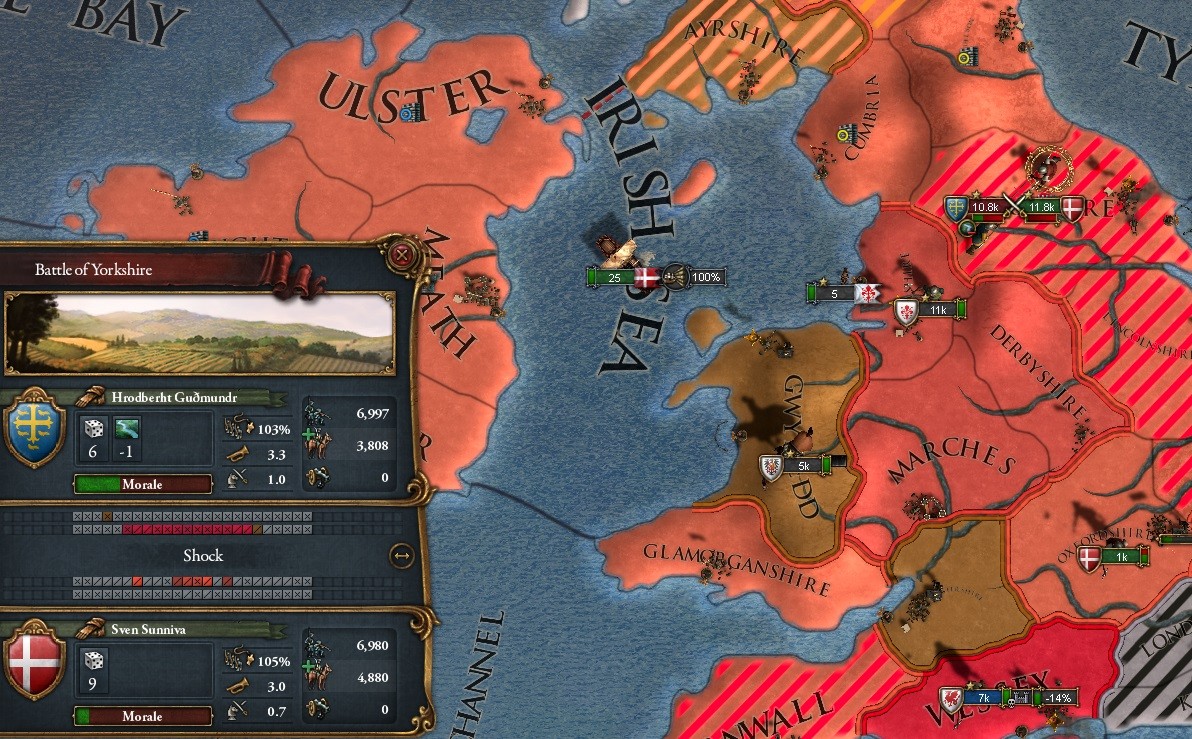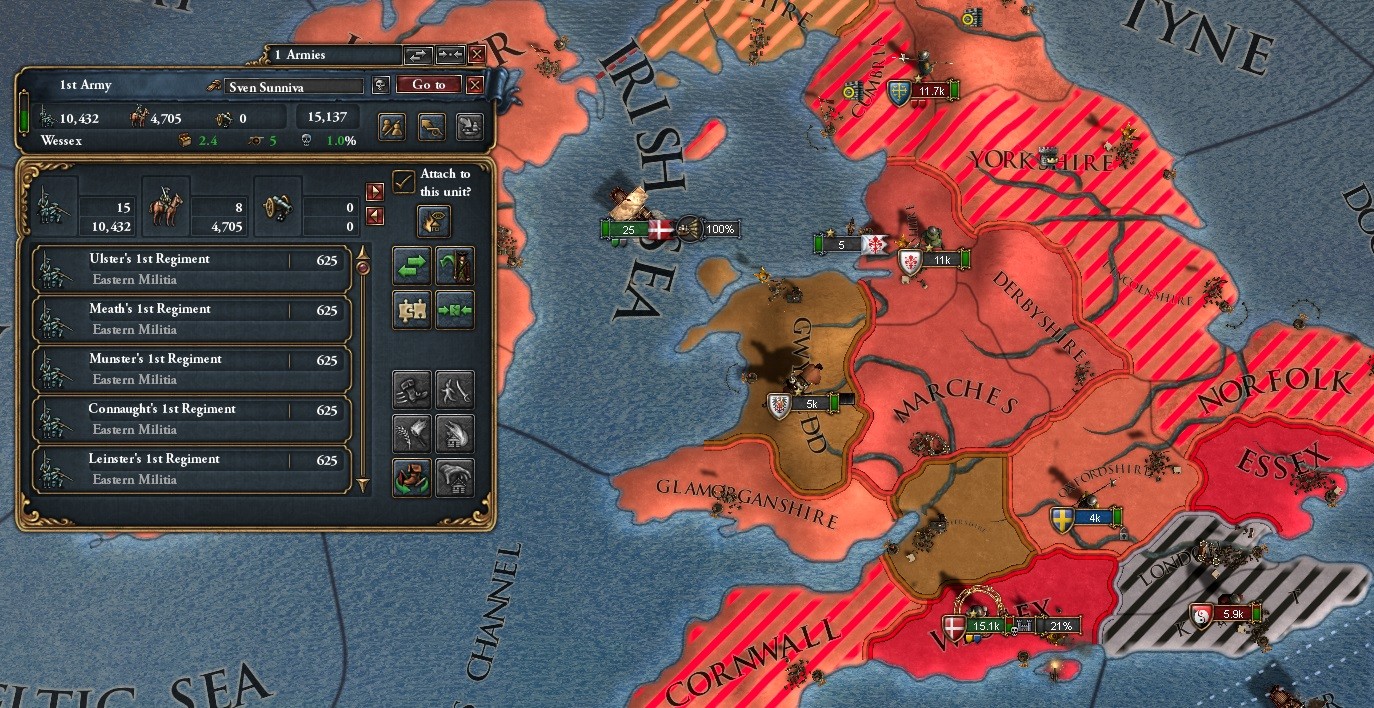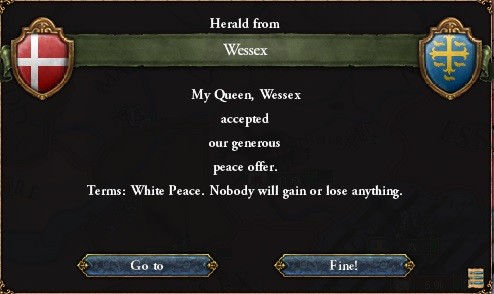Chapter 3: The wrath of Tyr
Iliana began a long-lasting tradition in the House of Hvitserk in her early days as Queen. Unlike the Empresses who had reigned before, she kept her own counsel. The days of large councils, of Moots called to decide issues, were over. Iliana could not afford even the barest hint of having her rule questioned, or she risked civil war. All of Denmark's decisions were her own. While she listened to advice, she rarely followed it. She knew her people, and she swore to do what was best for them, even if they didn't realize it.
One of the earliest signs that she was not her father's daughter was her choice of a new god to follow. Unlike her father's favorite, Freya, Iliana embraced Tyr, the god of justice. Tyr cared little for gold; he cared for blood, and so did his newest disciple. She instilled new drills in the army, which remained under the command of Sven Sunniva. However, the General (he had been demoted from the rank of Marshal) knew his orders and swore to uphold them, upon his death. After building a sizeable force of 20,000, the Royal Army crossed into Ayrshire, Skotland, with the hopes of engaging the enemy. As for Iliana, she remained in Castle Jorvik, where she gave birth to Alfridh, the new heir to the throne. Iliana had no king during her reign, and she never revealed who her chosen consort was. In any case, the succession was safe, and the Seer of Tyr proclaimed Alfridh "a warrior born, albeit not in a warrior's skin." Iliana raised her daughter personally, instilling in her values that would stand the test of time.
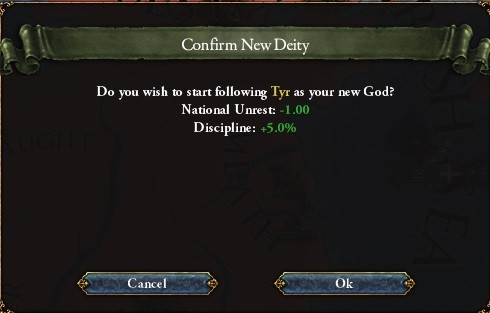 The adoption of Tyr as patron god of Denmark occurred shortly after Iliana's coronation (13 July 1475). Most Norse liked Freya, but Tyr was the god of justice, which meant violent retribution against the enemies of Denmark, something that was very possible. The new Seer of Tyr, Hans of Lothian, said that "Valhalla would be full under the reign of Iliana." As the future showed, he was not wrong.
The adoption of Tyr as patron god of Denmark occurred shortly after Iliana's coronation (13 July 1475). Most Norse liked Freya, but Tyr was the god of justice, which meant violent retribution against the enemies of Denmark, something that was very possible. The new Seer of Tyr, Hans of Lothian, said that "Valhalla would be full under the reign of Iliana." As the future showed, he was not wrong.
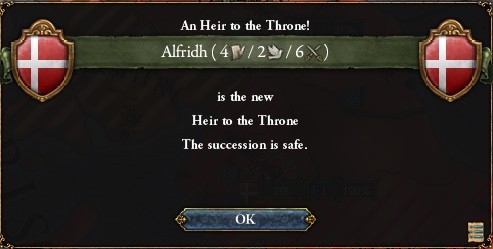 The birth of a daughter, Alfridh, did not set the nobility's mind at ease (11 October 1475). Most of the Danish nobility was looking for a way to unseat Iliana, or at the very least prevent any tradition of strong women from establishing itself in Denmark. To say that they failed would be an understatement.
The birth of a daughter, Alfridh, did not set the nobility's mind at ease (11 October 1475). Most of the Danish nobility was looking for a way to unseat Iliana, or at the very least prevent any tradition of strong women from establishing itself in Denmark. To say that they failed would be an understatement.
The one advisor that Iliana did trust, to a certain extent, was Marshal Hrothgar Mentzio. Mentzio was no field commander; gout had claimed one of his legs years before. However, he had an eye to the future, and he was among the first to start issuing pikes to Danish soldiers. The thinking was to interrupt enemy cavalry advances. Unlike the ill-fated Axe-Launcher, pikes were simple to use, effective, and rarely killed the person using them. After plenty of drill and training, every soldier held a pike. Their first test was an attempt to lift enemy control of Yorkshire. After General Sunniva found a good defensive position, the Royal Army dug in. The results were, on the surface, bad, but even though Denmark quit the field, they bloodied the enemy. If the Royal Army wasn't weak mercenaries, victory might have been certain. Then again, their enemy was already using pikes and had even begun working primitive firearms into their units. The gap was narrower, but it was not entirely bridged.
Queen Iliana took the results of the battle with sadness. Yorkshire would remain in enemy hands for a while longer, yet there was opportunity as well. Sweden had landed another army in Wessex. Rather than continue to fight on their own, the Queen ordered General Sunniva to link up with Sweden and lay siege to Wessex as well. Once their numbers were recovered and enemy forces started marching south, Sweden would be left to continue the siege while Danish forces moved into Oxfordshire. Denmark was to be a meat shield for Swedish siege equipments. Such cavalier regard for human life cast an ill shadow on Iliana, but she only cared about winning. She rebuffed two other peace offers from Wessex, who hoped to gain land from Denmark. The people grew agitated and angry: they wanted an end to fighting. Yet Iliana fought on, and her tenacity paid off. Although Denmark lost the Battle of Oxfordshire, it won the war: Wessex simply could not afford to fight off both the Danes and the even larger Swedish army that took Wessex in early January. Denmark and Wessex agreed to
status quo ante bellum, and the mercenaries were sent home.
 Sven Sunniva, never one to miss an opportunity, invented the Pike-Launcher shortly after pikes were introduced on 22 February 1476. An improvement on the Axe-Launcher design, the natural lack of aerodynamics of the average pike did not deter Sunniva's ever inventive (or, in the words of one critic, "bloody stupid") mind. His invention had a chain attached to the pike for easy retrieval. After the original prototype exploded (despite not being lit), the Pike-Launcher saw an early retirement.
Wessex troops were always just a little bit better than the Danish, but Iliana's decision to embrace Tyr drastically increased the number of casualties Danes inflicted. Sunniva did less and less of the fighting after the explosion of the Pike-Launcher prototype. 20 June 1476.
Sven Sunniva, never one to miss an opportunity, invented the Pike-Launcher shortly after pikes were introduced on 22 February 1476. An improvement on the Axe-Launcher design, the natural lack of aerodynamics of the average pike did not deter Sunniva's ever inventive (or, in the words of one critic, "bloody stupid") mind. His invention had a chain attached to the pike for easy retrieval. After the original prototype exploded (despite not being lit), the Pike-Launcher saw an early retirement.
Wessex troops were always just a little bit better than the Danish, but Iliana's decision to embrace Tyr drastically increased the number of casualties Danes inflicted. Sunniva did less and less of the fighting after the explosion of the Pike-Launcher prototype. 20 June 1476.
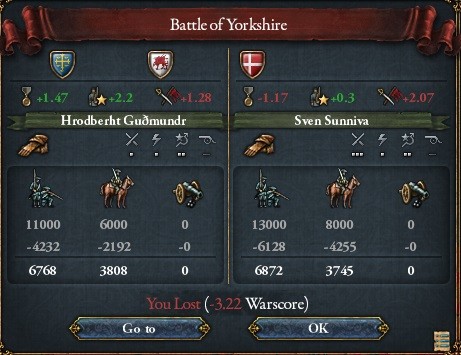 The Battle of Yorkshire proved the reliability of Danish pikes, if not the skill of Danish mercenaries. At the end of the battle (28 June 1476), Marshal Mentzio visited with many of the surviving soldiers and asked them what worked and what didn't. A particularly bright Colonel, Helgi Alfrid, attracted the notice of the Marshal. In the later Battle of Oxfordshire, Colonel Alfrid was given command of the Danish cavalry.
The first meeting between General Sunniva and the Swedish commander on 2 September 1476 was a cruel blow to Sunniva's fragile psyche. Not only were the Swedes unimpressed with the Pike-Launcher, a Swedish engineer ridiculed many of the general's other ideas, including the Pike-Launcher Mark II, the Arrow-Launcher (which was both slower and less accurate than using a bow), and the Axe-Launcher-Launcher, a weapon that would launch Axe-Launchers at the foe, which would then fire their projectiles at the last possible moment.
The Battle of Yorkshire proved the reliability of Danish pikes, if not the skill of Danish mercenaries. At the end of the battle (28 June 1476), Marshal Mentzio visited with many of the surviving soldiers and asked them what worked and what didn't. A particularly bright Colonel, Helgi Alfrid, attracted the notice of the Marshal. In the later Battle of Oxfordshire, Colonel Alfrid was given command of the Danish cavalry.
The first meeting between General Sunniva and the Swedish commander on 2 September 1476 was a cruel blow to Sunniva's fragile psyche. Not only were the Swedes unimpressed with the Pike-Launcher, a Swedish engineer ridiculed many of the general's other ideas, including the Pike-Launcher Mark II, the Arrow-Launcher (which was both slower and less accurate than using a bow), and the Axe-Launcher-Launcher, a weapon that would launch Axe-Launchers at the foe, which would then fire their projectiles at the last possible moment.
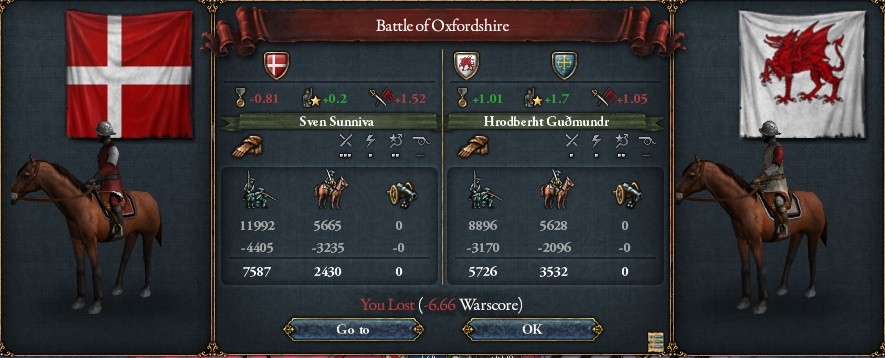 The Battle of Oxfordshire (14 December 1476) has the curious distinction of being celebrated as a victory, despite being a clear defeat. Helgi Alfrid's cavalry tactics greatly reduced Danish losses and earned him praise from the Marshal and even the Queen. Sven Sunniva's reputation, on the other hand, remained much the same. For the first time, Danish forces did not have launchers of any kind, which depressed the general so much that he stayed in his tent for the entire battle.
The Battle of Oxfordshire (14 December 1476) has the curious distinction of being celebrated as a victory, despite being a clear defeat. Helgi Alfrid's cavalry tactics greatly reduced Danish losses and earned him praise from the Marshal and even the Queen. Sven Sunniva's reputation, on the other hand, remained much the same. For the first time, Danish forces did not have launchers of any kind, which depressed the general so much that he stayed in his tent for the entire battle.
The Peace of Wessex (12 January 1477) occurred two days after Wessex fell to Swedish hands. Iliana considered waiting longer, but her people needed time to heal. The last Wessex soldier marched out of Castle Jorvik a few hours after the treaty was signed. Iliana vowed a blood oath that Castle Jorvik would never fall again.
With the war over, Iliana had time to rebuild. The core of the Danish army remained, 5,000 strong, but the mercenaries were dismissed. By reducing army maintenance, Denmark earned enough gold to pay off their loans, leaving Denmark financially independent once again. General Sven Sunniva, who never recovered from his encounter with Swedish engineering, retired after the war and died, heartbroken, in August 1478. The loss of Swedish subsidies left Denmark with little room for profit, however. Profit was the last thing on the mind of Danish nobility, however.
Iliana's flagrant denial of peace and her brusque manner had won her few friends. Only Hrothgar Mentzio, Marshal of Denmark, was kind to her. The rest of Denmark's elite, fed up with war and the idea of letting a mere woman rule over them, began to plot for the throne. The outskirts of Castle Jorvik, named Yorkshire by local peasants, had been devastated by war and constant occupation. Only Irland was safe from enemy attack, but plenty of Irland's sons had died in battle. When Iliana started musing about the possibility of a war on Norway, the nobles of Denmark knew they had to act.
Nobody knows who actually delivered the killing blow. Iliana was, according to official reports from the period, "waylaid by highwaymen" during an evening stroll of the Yorkshire countryside, despite the fact that she had bodyguards and that Iliana always carried Skullsplitter, except on this one particular night. The circumstances of her death may never be fully comprehended, but the consequences were obvious. A Regency Council, headed by Marshal Mentzio, ran the country in Alfridh's name, while a Pretender rose up in Oxfordshire to march on the capital and demand a Moot to choose a new King.
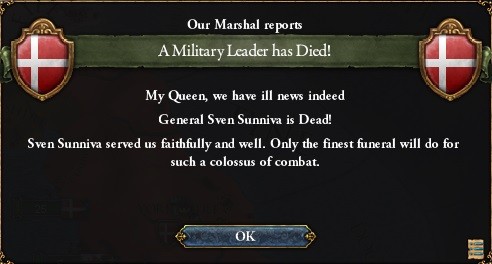 The funeral of Sven Sunniva (1 August 1478) was surprisingly poorly attended. Queen Iliana was there, as was Marshal Hrothgar Mentzio, but only the Seer was there apart from them. At his request, the words "Genius Inventor" were engraved on his tombstone. However, the tombstone was repeatedly vandalized, and eventually the inscription faded with time. He was buried with the Axe-Launcher-Launcher. Grave robbers tried to steal it, but it exploded and killed them both.
The funeral of Sven Sunniva (1 August 1478) was surprisingly poorly attended. Queen Iliana was there, as was Marshal Hrothgar Mentzio, but only the Seer was there apart from them. At his request, the words "Genius Inventor" were engraved on his tombstone. However, the tombstone was repeatedly vandalized, and eventually the inscription faded with time. He was buried with the Axe-Launcher-Launcher. Grave robbers tried to steal it, but it exploded and killed them both.

The evening of 5 January 1479 is one of the most crucial nights in Danish history, yet no accounts of what actually happened survive to this day. Tjudmund Sörkver, the Pretender to the Throne, claimed he was Iliana's husband and Alfridh's father. Nobody had ever heard of him before. His movement ended rapidly when one of his followers crossed into Derbyshire, Florentine territory, to mount an assault on Yorkshire. Florentine soldiers put paid to the Pretender and delivered his head to the Regency Council as a sign of good faith between Florence and Denmark.
The Regency Council, after the Pretender's death, swore that Denmark would never go to war again. Only Marshal Mentzio tried to expand the army; the other regents ordered the construction of a Temple to Tyr in Yorkshire, with the objective of winning his favor. The Council also improved relations with Gwynedd, thinking that a local friend would be of use in future warfare. As for relations between Denmark and Florence, they ebbed and flowed. On the one hand, one of the regents approved export licenses to sell Danish goods in Florence, which increased Danish cash flow. On the other hand, the Pretender's incursion into Derbyshire triggered extensive research in Royal Archives, which revealed ancient claims to the province.
Two obviously opposing ideas like those reflected the composition of the Regency Council. There was constant infighting among the regents. While Hrothgar Mentzio was nominally the Chair of the Council, Mentzio was also the most warlike of the regents. Many of the other members of the council were simple noblemen that craved peace and a chance to enrich themselves at the expense of the crown. Budget constraints saw many shifts in Danish policy. For a brief period, it looked like the Marshal was going to triumph, especially when he adopted the first Danish firearms. However, the Marshal also wanted to protect the rights of the crown. Queen Alfridh, although only eight years old, was the biggest point of contention between the two sides. The noblemen wanted to use her as a pawn; the Marshal wanted her to grow up strong, like her mother, and to rule Denmark as Iliana had. After the Royal bodyguard was equipped with the new
arquebus, a French firearm, the rest of the Regency Council acted to not only displace Mentzio as Chair of the Council, but to fire him as well. The new Marshal was Helgi Alfrid, who commanded the 6,000 man Danish army. Alfrid was given relative autonomy in military affairs in exchange for complete neutrality in all political disputes; the new Marshal happily accepted.
 Helgi Alfrid was appointed a General on 5 January 1479. Like Sven Sunnigar, he had many ideas; unlike his predecessor, his ideas were good. Alfrid drilled his men mercilessly with the new
Helgi Alfrid was appointed a General on 5 January 1479. Like Sven Sunnigar, he had many ideas; unlike his predecessor, his ideas were good. Alfrid drilled his men mercilessly with the new arquebus
, but was most interested in speed. He knew how to get the most out of man and beast, which didn't make him popular but did make him good at his job. He also knew how to keep his mouth shut.
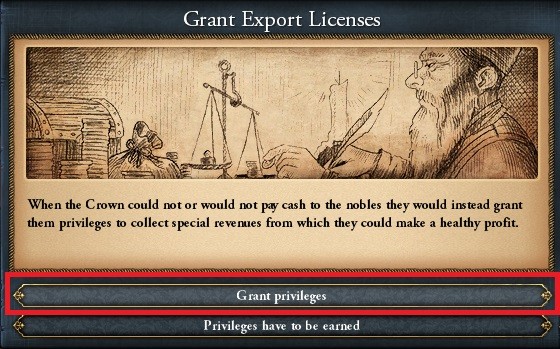 The decision to allow Danish merchants to sell to Florentines was a way to bring in money in the short term. The Regency Council's decree, dated 1 February 1482, was signed by every member of the Council except Marshal Mentzio. The Marshal wanted war with Florence, not commerce.
The decision to allow Danish merchants to sell to Florentines was a way to bring in money in the short term. The Regency Council's decree, dated 1 February 1482, was signed by every member of the Council except Marshal Mentzio. The Marshal wanted war with Florence, not commerce.
 The Marshal got his way on 25 April 1482. He convinced the other regents that all he wanted was the
The Marshal got his way on 25 April 1482. He convinced the other regents that all he wanted was the ability
to declare war on Florence, but swore he would not do so in the near future. With only 6000 troops, Florence outnumbered Denmark more than 2:1. It did not take a Marshal to figure out those odds.
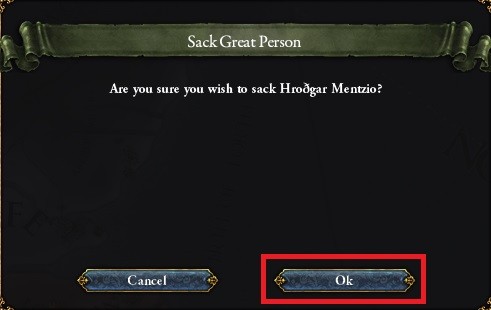 The firing of Hrothgar Mentzio--and promotion of Helgi Alfrid-- ended any further attempts by the army to try to lead the country. Mentzio was not out of work for long: after being fired on 9 December 1483, he traveled to France and taught courses on Danish military history. His courses were very popular, but only because everyone needs a laugh from time to time.
The firing of Hrothgar Mentzio--and promotion of Helgi Alfrid-- ended any further attempts by the army to try to lead the country. Mentzio was not out of work for long: after being fired on 9 December 1483, he traveled to France and taught courses on Danish military history. His courses were very popular, but only because everyone needs a laugh from time to time.
The Danish nobility spent their time strengthening their position vis-a-vis the monarchy in the waning days of the regency. They could not do anything overtly disloyal, as the army was still very much an institution that needed to be respected. They took what they could but no more. They also showed flexibility. After Gwynedd demanded Danish lands to even
consider an alliance, a member of the Regency Council--diplomat Tryggve Orm--sailed to Sjaelland and made his own alliance with them.
While the Regency Council made their own policy, they failed to notice the blossoming of young Alfridh. Taught by men loyal to the memory of Iliana, Alfridh learned from her mother's mistakes. Instead of ruling by sheer force of will, she chose to rule much more subtly. Alfridh knew that the loyalty of the army was the key to a successful reign, and she befriended Marshal Alfrid. She learned the essence of military strategy from him, but had other tutors as well. One of these was a bureaucrat named Halfdan Magnusson (about 25% of all men born in Denmark were named Halfdan). While Halfdan courted her as she became a woman, she was learning all she could about administration. Unlike her mother, Alfridh acknowledged Halfdan Magnusson as the father of her son, Gunnar, who was born shortly before Alfridth reached her majority. However, he was never more than a consort, and they never married.
It was Alfridh's idea to repair the damage to the economy that multiple wars had caused. Although she was technically too young to rule, she convinced the nobility of the wisdom of her scheme by offering vague promises of lands and riches. No Danish elite could ever believe a girl had manipulated them (or, at the very least, would never admit it), so once she got her way, they presented the idea as their own. In truth, it was the sort of thing that the elite would have done anyway. What they did not expect was that she would use the illusion that she had surrendered to "their" idea as a way to force them to make concessions. Much of the powers and rights the nobility acquired during the regency melted away. If they wanted to complain, they would have to fight the army (and her protective consort). It was not the last time that she would outmaneuver somebody who wished to place her in a bad or compromising position.
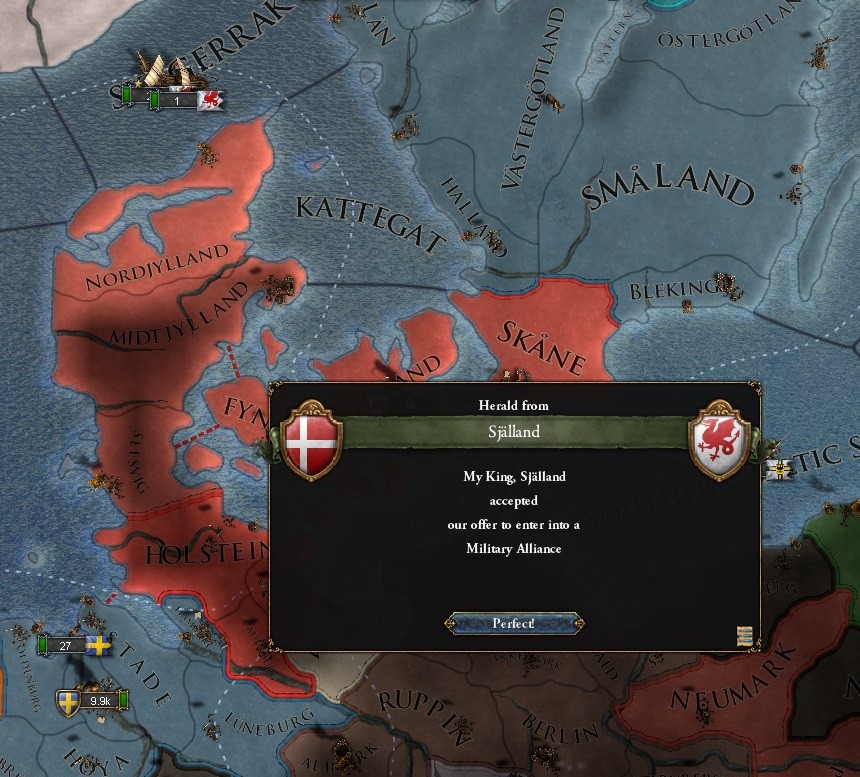
Even if the Regency Council preferred an alliance with Gwynedd, Sjaelland was a good compromise solution. The Second Alliance of Sjaelland (27 July 1486) provided another key friend to the Danes in case of another attack.
 The Decree on the Economy, signed 14 August 1487, was a surprising achievement for a girl so young. Some historians attributed it to Halfdan Magnusson, and while he probably had something to do with it, it was Alfridh who made the decree a reality. It began the road to recovery for Denmark, albeit one filled with potholes and not a few bodies.
The Decree on the Economy, signed 14 August 1487, was a surprising achievement for a girl so young. Some historians attributed it to Halfdan Magnusson, and while he probably had something to do with it, it was Alfridh who made the decree a reality. It began the road to recovery for Denmark, albeit one filled with potholes and not a few bodies.
 The coronation of Alfridh on 16 October 1490 effectively ended any resistance from the nobility. Her competency bought her a lot of goodwill, and she wasn't afraid to use it.
The coronation of Alfridh on 16 October 1490 effectively ended any resistance from the nobility. Her competency bought her a lot of goodwill, and she wasn't afraid to use it.
--------------------------------------------------------------------------------------------------------------------------------------------
Not too much commentary for this update. It's worth emphasizing how weak the British Isles are, economically, without London in EUIV. I needed to scrape and claw to get as far as I did. In hindsight, I wish I'd held out against Wessex, since I probably could have beaten them. Still, in the next update, I'm going to get some unexpected lands, which will more than make up for the non-event of this update. Firing Mentzio was about saving cash, in reality. I needed everything I could get. I did manage to pay off most of the loans, though. As for the future, well, you'll need to wait until next time!







